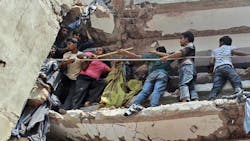Rescuers Find 50 Survivors in Bangladesh Factory
SAVAR, Bangladesh -- Rescuers found 50 people alive late Friday in the rubble of a Bangladesh garment factory complex making Western brand clothes that caved in two days earlier, leaving over 300 workers dead.
A total of 304 people are so far known to have died after the eight-story building collapsed in the industrial area of Savar town on the outskirts of the Bangladesh capital Dhaka on Wednesday morning, according to the army.
"We have found around 50 people still alive at several places on the third floor after digging tunnels," said Sheikh Mizanur Rahman, deputy director of the Bangladeshi fire service. “We hope we can rescue them by tomorrow morning.”
The discovery of more survivors brought new hope to the thousands of desperate relatives huddled at the disaster site, but an intense stench of decomposition suggested many bodies remain trapped in the rubble.
"We've rescued about 80 people alive from the rubble today (Friday)," Rahman added.
More than 2,300 people had been rescued alive since the collapse but many are severely injured, the army said.
Exhausted rescue teams of soldiers, firemen and volunteers using concrete-cutters and drilling machines were racing against time in searing heat to find more survivors from the country's worst industrial disaster.
As night fell, spotlights shone on the mountain of mangled concrete and steel, and relatives held photographs of missing family members waiting for news.
Crowd Control
Earlier in the day, police battled to control huge angry crowds of garment workers protesting over the tragedy, the latest to befall Bangladesh's huge garment sector which is a big foreign exchange earner for the poor nation.
Widespread anger has been fuelled by revelations that factory bosses forced workers to return to the building on Wednesday despite cracks appearing in the building the previous day.
Police fired tear-gas and rubber bullets at the workers -- who sew clothes for well-known Western brands for as little as $37 a month -- as they blocked roads and attacked factories and buses in textile-making districts around Dhaka.
"The situation is very volatile," said M. Asaduzzaman, an officer in the police control room in manufacturing hub Gazipur.
The Rana Plaza building collapsed within minutes on Wednesday morning.
British low-cost fashion line Primark and Spanish giant Mango have acknowledged having their products made in the block, while a host of brands including Walmart and France's Carrefour are investigating.
The accident has prompted new accusations from labor activists that Western clothing companies place profit before safety by sourcing their products from Bangladesh, despite its shocking track record of deadly disasters.
Locked Exits
Last November, a blaze at a factory making products for Walmart and other Western labels left 111 people dead, with survivors describing how fire exits were kept locked by site managers.
UN Secretary-General Ban Ki-moon said he was "deeply saddened by the loss of life" caused by the incident, according to his spokesperson, and extended an offer of assistance to Bangladesh.
The New York-based Human Rights Watch said the building collapse "shows the urgent need to improve Bangladesh's protections for worker health and safety."
With many of the country's 4,500 factories already shut due to protests and fears of damage, manufacturers declared Saturday a holiday and trade unions called a strike for Sunday to demand better working conditions.
"Enough is enough. It's time the government acted. They should save garment workers, not factory owners!" Mosherafu Mishu, a leader of the Garment Workers Unity Forum, told a rally in Dhaka.
Amid frustration about the slow pace of progress, thousands of relatives at one point burst onto the disaster site, prompting police to fire tear gas to disperse the crowd.
At nearby Enam Medical College Hospital, doctors struggled to treat around 1,200 people admitted since Wednesday morning, many with missing limbs or with such bad injuries they required amputations.
"Some have gangrene," doctor Hiralal Roy said.
Police, meanwhile, made a string of raids to track down the factory and building owners after Prime Minister Sheikh Hasina vowed to bring them to justice.
Shafiq Alam, AFP
Copyright Agence France-Presse, 2013
About the Author
Agence France-Presse
Copyright Agence France-Presse, 2002-2025. AFP text, photos, graphics and logos shall not be reproduced, published, broadcast, rewritten for broadcast or publication or redistributed directly or indirectly in any medium. AFP shall not be held liable for any delays, inaccuracies, errors or omissions in any AFP content, or for any actions taken in consequence.
